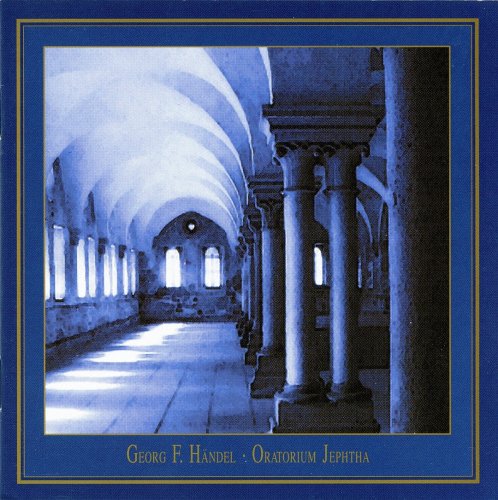CD 1
01 Overture
02 ACT ONE. Scene 1. Accompagnato and Air (Zebul): “It must be so - or these vile Ammonites” ... “Pour forth no more unheeded prayers”
03 Scene 1. Chorus of Israelites: “No more to Ammon’s god and king”
04 Scene 2. Recitative & Air (Jephtha): “But Jephtha comes” ... “Virtue my soul shall still embrace”
05 Scene 2. Recitative & Air (Storgè): “Twill be a painful separation” ... “In gentle murmurs will I mourn”
06 Scene 3. Recitative & Air (Hamor): “Happy this embassy” ... “Dull delay, in piercing anguish”
07 Scene 3. Recitative & Air (Iphis): “Ill suits the voice of love” ... “Take the heart you fondly gave”
08 Scene 3. Recitative (Hamor) & Duet (Iphis, Hamor): “I go. My soul, inspir’d by thy command” ... “These labours past, how happy we!”
09 Scene 4. Recitative & Accompagnato (Jephtha): “What means these doubtful fancies of the bain?”” ... “If, Lord, sustain’s by Thy almighty power”
10 Scene 4. Chorus of Israelites: “O God, behold our sore distress”
11 Scene 4. Recitative (Zebul, Jephtha): “Such, Jephtha, was the haughty king’s reply”
12 Scene 4. Chorus of Israelites: “When His loud voice in thunder spoke”
13 ACT TWO. Scene 1. Recitative (Hamor): “Glad tidings of great joy to thee, dear Iphis”
14 Scene 1. Chorus of Israelites: “Cherub and Seraphim, unbodied forms”
15 Scene 1. Air (Hamor): “Up the dreadful steep ascending”
16 Scene 1. Recitative & Air (Iphis): “Tis well. Haste, haste, ye maidens” ... “Tune the soft melodious lute”
17 Scene 2. Recitative & Air (Jephtha): “Heav’n smiles once more” ... “His mighty arm, with sudden blow, dispers’d”
18 Scene 2. Chorus: “In glory high, in might serene”
CD 2
01 Scene 3. Sinfonia - Recitative (Iphis): “Hail, glorious conqueror”
02 Scene 3. Air (Iphis): “Welcome as the cheerful light” ; Chorus of Virgins: “Welcome thou, whose deeds conspire”
03 Scene 3. Recitative & Air (Jephtha): “Horror, confusion!” ... “Open thy marble jaws, O tomb”
04 Scene 3. Recitative (Zebul, Jephtha): “Why is my brother thus afflicted?”
05 Scene 3. Accompagnato & Air (Storgè): “First perish thou, and perish all the world!” ... “Let other creatures die?”
06 Scene 3. Recitative & Air (Hamor): “If such thy cruel purpose” ... “On me let blind mistaken zeal”
07 Scene 3. Quartet (Zebul, Storgè, Hamor, Jephtha): “Oh, spare your daughter”
08 Scene 4. Recitative & Accompagnato (Iphis): “Such news flies swift. I’ve heard the mournful cause” ... “For joys so vast too little is the price”
09 Scene 4. Air (Iphis): “Happy they! This vital breath”
10 Scene 4. Accompagnato (Jephtha): “Deeper, and deeper still, thy goodness, child”
11 Scene 4. Chorus: “How dark, O Lord, are Thy decrees”
12 ACT THREE. Scene 1. Accompagnato (Jephtha): “Hide thou thy hated beams, O sun, in clouds”
13 Scene 1. Air (Jephtha): “Waft her, angels, through the skies”
14 Scene 1. Accompagnato & Air (Iphis): “Ye sacred priests” ... “Farewell, ye limpid springs and floods”
15 Scene 1. Chorus of Priests: “Doubtful fear and rev’rent awe”
16 Scene 1. Recitative & Air (Angel): “Rise, Jephtha, and ye rev’rend priests” ... “Happy, Iphis shalt thou live”
17 Scene 1. Arioso (Jephtha): “For ever blessed be Thy holy name”
18 Scene 1. Chorus of Priests: “Theme sublime of endless praise”
19 Scene 2. Recitative & Air (Zebul): “Let me congratulate this happy turn” ... “Laud her, all ye virgin train”
20 Scene 2. Recitative & Air (Storgè): “Oh, let me fold thee in a mother’s arms” ... “Sweet as sight to the blind”
21 Scene 2. Recitative (Iphis): “My faithful Hamor, may that Providence” ; Duet (Iphis, Hamor): “All that is in Hamor mine” ; Quintet (Iphis, Hamor, Storgè, Jephta, Zebul): “Joys triumphant crown thy days”
22 Scene 2. Chorus of Israelites: “Ye house of Gilead, with one voice”
This recording is part of a cycle of old testament oratorios by G. F. Handel and is one of the many concerts performed at Maulbronn monastery over the past years. The Maulbronn monastery, founded by Cistercian monks in the year 1147, is the only completely preserved mediaeval complex north of the Alps and since 1994 as the 13th German site on the list of UNESCO World Heritage Sites. The series of recordings combines authentically performed baroque oratorios with the optimal acoustics and atmosphere of this unique monastic church. This ideal location demands the transparency of playing and the interpretive unveiling of the rhetoric intimations of the composition, which is especially aided by the historically authentic performance. The music is exclusively performed on reconstructed historical instruments, which are tuned to the pitch customary in the composers lifetime (a = c. 415 Hz).
Soloists: Emma Kirkby (soprano), Melinda Paulsen (mezzo-soprano), Charles Humphries (alto), Julian Podger (tenor), Stephen Varcoe (bass)
Ensembles: Baroqueorchestra of the Maulbronn Concerts (on period instruments), Maulbronn Chamber Choir
Conductor: Jürgen Budday



